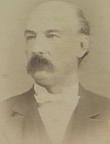Composer, musician, conductor, teacher, music critic.
Charles Edward Horsley was the son of composer William Horsley. His family was closely associated with Felix Mendelssohn. Taking the famous composer's advice, William Horsley sent his son to Germany to study under Moritz Hauptmann and Louis Spohr. Upon his return to England, Horsley found various employment opportunities as an organist, composer, and music teacher. His achievements during his early career include composing two oratorios: David (ca. 1846) and Joseph (ca. 1849). He was also the organist at St John's, Notting Hill, between 1853 and 1857.
In 1861, Horsley travelled to Australia, where he settled in Melbourne. He was appointed to various positions over the next ten years, including organist at Christ Church (South Yarra), St Stephen's (Richmond), and St Francis' (Melbourne), and, in 1866, the conductorship of the Orpheus Union (a musical society devoted almost exclusively to part-singing). During his time in Australia, Horsley acted as a music critic, conducted the Melbourne Philharmonic Society Choir, and wrote a number of compositions (including several cantatas). Among his major Australian works was a musical masque, The South-Sea Sisters, the result of his collaboration with compatriot R. H. Horne (q.v.).
Horsley was forced to move from Melbourne to Sydney in 1867 after having been declared insolvent the previous year. His bankruptcy was the result of heavy losses he incurred as organiser of the Melbourne Intercolonial Exhibition's music festival. In 1870, he returned briefly to Melbourne in order to undertake a commission to compose a cantata to one of Henry Kendall's (q.v.) poems. The work, titled Euterpe, was performed at the Melbourne Town Hall in August 1870. (It also received a performance in London in 1976.) Not long after completing the cantata, Horsley returned to England, but by 1873 he had again moved on, this time to New York. It was here that he became both the organist at St John's Chapel and conductor for the Church Music Association. He died in New York three years later.
 2234215523117583601.jpg
2234215523117583601.jpg
 2234215523117583601.jpg
2234215523117583601.jpg